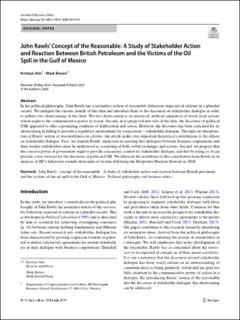John Rawls' concept of the reasonable: A study of stakeholder action and reaction between British Petroleum and the victims of the oil spill in the gulf of Mexico
Journal article, Peer reviewed
Published version
Date
2020Metadata
Show full item recordCollections
Abstract
In his political philosophy, John Rawls has a normative notion of reasonable behaviour expected of citizens in a pluralist society. We interpret the various strands of this idea and introduce them to the discourse on stakeholder dialogue in order to address two shortcomings in the latter. The first shortcoming is an unnoticed, artificial separation of words from actions which neglects the communicative power of action. Second, in its proposed new role of the firm, the discourse of political CSR appeared to offer a promising synthesis of deliberation and action. However, the discourse has been criticized for its shortcoming in failing to provide a regulatory environment for corporation—stakeholder dialogue. Through our interpretation of Rawls’ notion of reasonableness in citizens, the article makes two important theoretical contributions to the debate on stakeholder dialogue. First, we transfer Rawls’ injunction in insisting that dialogues between business corporations and their weaker stakeholders must be understood as consisting of both verbal exchanges and actions. Second, we propose that the coercive power of government ought to provide a necessary context for stakeholder dialogue, and that by doing so, it can provide a way forward for the discourse of political CSR. We illustrate the usefulness of this contribution from Rawls in an analysis of BP’s behaviour towards thousands of victims following the Deepwater Horizon blowout in 2010.

